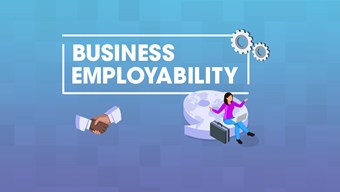Samuel March is currently studying the GDL at our Moorgate campus with aspirations of becoming a criminal barrister, but that hasn’t stopped him continuing his passion for the environment and sustainability. He recently won the 2018 Andrew Lees essay competition for his argument regarding the statement that “the right to a healthy environment is a fundamental human right”.
By Cara Fielder. Published 18 June 2018. Last updated 19 August 2022.
His essay will be published in the next edition of e-law. We sat down with Sam to find out about his passion for the environment, what prompted him to undertake a conversion course into law and why he entered the essay competition.
From completing my undergraduate degree to starting the GDL, my career has taken quite a dynamic path. I opted to study Education, English and Drama as Part 1 of my Cambridge undergraduate degree because I’d always wanted to be a teacher from an early age. I switched to Management Studies for my final year because I wanted to attain financial independence on completing my degree. I promptly landed a job in a high-energy social media marketing agency, where I got some really valuable experience in marketing. I felt conflicted about working in an industry that focuses on fuelling consumerism to drive perpetual growth, though, so I swapped agency life for NGOs and non-profits concentrating on international policy and sustainability.
While working for various NGOs I worked as a communications consultant. It was a rewarding move, allowing me to feel like I was supporting organisations in their advocacy efforts for global good. The trade and sustainable development world is a conflicted one, though. It has sustainability at its core, being critically aware of environmental pressures and the importance of an inclusive economic transformation of the developing world; it’s also deeply rooted in post-war neo-liberal institutions struggling with an unsustainable addiction to GDP growth as a key measure of success.
Working at the NGOs felt somewhat removed from the front line. It was great environment in which to develop an awareness of the kind of pressures we’re facing, but it made me realise how important having a job with a purpose is to me and digital communications felt too far away for my liking. I realised I don’t want to spend my career in a back office tweeting; I want to effect actual change for real people. I figured that I can achieve this as an advocate, so I moved back to London and began studying the GDL.
Choosing to study at The University of Law was an easy decision to make. It was based on a combination of recommendations from various acquaintances, an ideal location, and ULaw’s high pupillage rate for BPTC students. I was also able to start the course in January, rather than having to wait until the next academic year in September. After the GDL I’m planning on spending a year working as a paralegal or with a charity that will allow me to develop my advocacy skills. Then I want to apply for a place on the BPTC at ULaw then move into working at the criminal bar.
The modular teaching of the GDL (now the PGDL) is really helpful. There’s a huge amount of information to learn and having it broken down into manageable chunks is useful. It’s funny, even the modules I thought I’d find quite dry have been really interesting. No matter what the module, at the core of every case is a question of what’s right or wrong, and that’s always interesting to think about.
The structure of the course has made the transition to a law qualification easier to handle. I struggled at first, adapting to the delivery style required for exams and essays, but the tutors are very good at emphasising how important a certain kind of structure is to a legal argument. I’ll leave the GDL with the ability to approach legal issues in a much more structured way that how I approached arts subjects in the past.
When I started the course I was thinking of pursuing a career in human rights or environmental law but I wanted to leave my options open. Since starting the course I’ve realised I really want to work at the criminal bar. The course opens a lot of doors though, so I’m still keeping an open mind and will apply my newly-acquired skills wherever they ultimately make the biggest impact.
Entering the Andrew Lees essay competition gave me a chance to channel my passion for the environment outside of the rules of legal essay writing. It requires a particular style to write essays for a legal qualification and we’re explicitly advised against passion, political posturing and melodramatics to construct a successful essay for the course. The essay competition allowed me to indulge in those areas, and apply some legal knowledge in a slightly more free-form way. Now that’s out of my system, I can play by the rules and follow the structures that work for my exams.
I chose the Andrew Lees competition because I think everyone should have a passion for the environment and sustainability. I don’t really understand how anyone doesn’t. I’m going to be an uncle soon, and it would be nice if we could leave the next generation with a planet that’s inhabitable. Pursuing a career as a criminal barrister probably won’t allow me much chance to use my legal skills to take climate action, unless we start seriously prosecuting crimes against the environment, but I’ll still aim to make a difference by doing the small things anyone can do: consume less, consume ethically, stay engaged, and vote sensibly.
My main piece of advice to anyone considering the GDL at ULaw would be go for it. Just don’t expect it to be easy. I think it’s challenging no matter where you did your undergraduate: it requires a different set of skills and a totally new approach to essays and questions. Whatever worked for you before, forget it – trust your tutors, follow their structures, and play by their rules – and if you’re dying to write about something not on the syllabus, then enter an essay competition.
Whether it’s through the legal sector, entrepreneurship or corporate business, find out how a qualification from The University of Law and our Business School can help you achieve your ambitions by checking out our law and business courses on our website.



